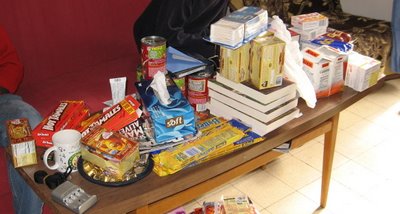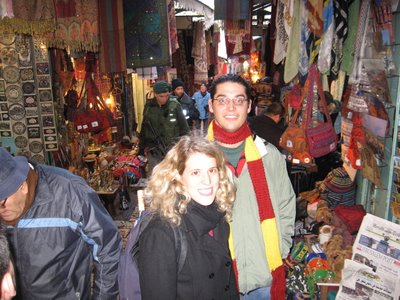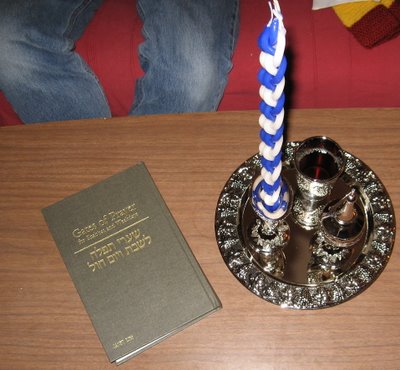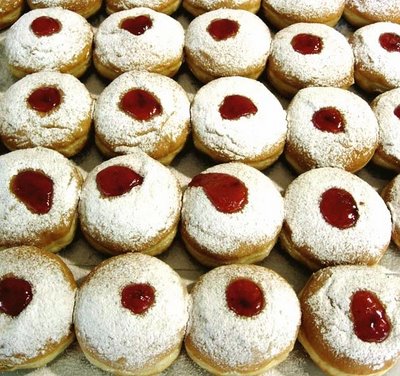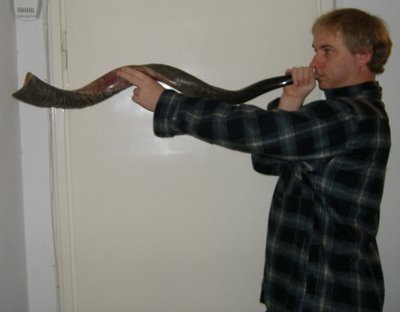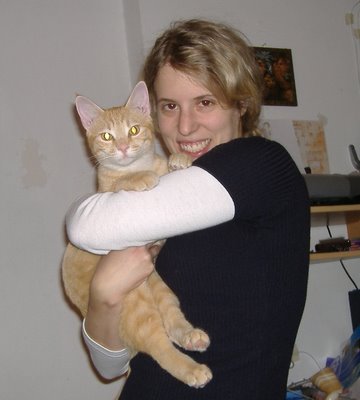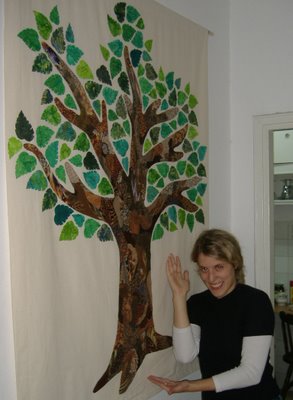First, I have bad news. We lost our camera! All the pictures from this trip are collected from other people’s links - thanks to all HUC students who I’ve copied from.
If the last trip was about modern Israel, this one was definitely about the ancient world. The 2nd temple was destroyed in 70 CE, and we started our journey fleeing Jerusalem with the ancient rabbis. Wednesday morning we took the bus to Caesaria, an ancient city that started out as 50% Greek and 50% Jewish. It was built by Herod, and later became a Byzantine town, and then a Crusader fort. We walked through the ancient amphitheatre, racetrack, multiple public buildings, and finally sat and read some Talmudic texts detailing when the rabbis had lived there. Apparently the rabbis at this time weren’t at all Orthodox as we picture them today – many had professions besides being rabbinic judges, and they were quite assimilated. One of the texts we read was about a rabbi discussing theology with a Roman matron, a gentile woman.
Around 135 CE the Jews revolted one last, final time. Rabbi Akiva, the head of the revolt, was massacred in Caesaria, and the remaining Jews packed up their bags to travel north. (As an aside, it’s interesting how to the Jews, the north was the boonies – but to Christians, it’s the main part of Israel tourism. Pontius Pilate sat in Caesaria, and there’s a pillar inscribed with his name in an area near a big public building.)
After Caesaria we went to Tzippori (Greek name Sepphoris), a northern town where Rabbi Judah HaNasi settled after the Bar Kochba Revolt. He resettled the Sanhedrin there (an assembly of 71 scholars which also served as the Jewish Supreme Court). They wrote the Mishnah there (book of Jewish law, half of what’s known as the Talmud). I’d never known, even though the Talmud is called the “Jerusalem Talmud,” none of it was ever written in Jerusalem proper, because the Jews had already been exiled from there! (the Babylonian Talmud, on the other hand, really was written in Babylonia, and because Babylonian Jews didn’t have to constantly be on the run, it’s much longer and more comprehensive).
Anyway, Tzippori is gorgeous. The floors of its buildings are covered with beautiful mosaics, including one that’s known as the “Mona Lisa of the Galilee.” The Jewish buildings are in close proximity to the Greek ones, and are filled with Greek imagery (the synagogue even has a mosaic of the zodiac symbols). This raises a lot of questions about the amount of secular acceptance in that time. Instead of thinking that the Tzippori synagogue is a fluke, the current theory is that mishnaic/Talmudic Judaism wasn’t necessarily followed by everyone, but only by a select few. The only surviving literature we have is from Talmudic rabbis, but that doesn’t mean that the masses were much more secular. It’s like if Conservative and Orthodox literature were the only texts to survive a thousand years from now, and they said that choirs in a synagogue are Christian-based and unacceptable. If archeologists found evidence of choirs in lots of American temples, they’d think that they came across a rogue Jewish cult – instead, they now think that secularity was much more widespread than the texts would lead us to believe. Just like today, there was a huge spread of Jewish practices in the old days, it wasn’t purely one stream.
After Tzippori, we checked into our hotel in Tiberius, and HUC treated us to a very fancy dinner. SO MUCH FOOD! For dessert they served crepes. My lovely husband went over to the crepes table afterwards, and he, along with a professor, started making their own crepes while the waitress was away! They didn’t even get into trouble, the waitress just glared at them, said “what are you doing?!” and took the table away. It was really fun… and they were good crepes!
Thursday we loaded ourselves up to go to Tzfat, the ancient city where Kabbalah, Jewish mysticism, was founded in the 1500s. We visited three beautiful synagogues, visited a local artist who explained his work, and had lots of free time to see the art galleries. Tzfat also happens to be the city where my father was raised, so we called him on the cell phone and he led us, with perfect directions, to his childhood house. We took so many pictures, I’m sad we don’t have them. But it was surreal to have him describe on the phone, “right past the bridge there is a small alleyway. Five meters down is a building with lots of ivy. There’s a metal gate below the biggest patch of ivy that leads into a porch.” And lo and behold, there it was! I guess you never forget the place where you grow up.
Right across the street from Abba’s old house was a Yemenite synagogue. The front was closed, so we went in the back, and ended up in the women’s section on the second floor. Then it turns out this guy had followed us upstairs because we weren’t supposed to be there! He led us down and locked the place behind us. Jonathan and I cracked up – he got in trouble for making crepes, me for sneaking into synagogues!
Then we went in search of food, and ended up at this tiny hole-in-the-wall pizza place. The man rolled out the dough in front of us, added herbs into the sauce, and even tasted it before he spread it onto our pizza! Talk about handmade. We also got into a great conversation with two haredi (ultra-orthodox) women in their 60s who were at the next table. They were from America originally, but now lived in Tsfat. One has eight children, and the other was never married. The owner of the restaurant left for an appointment halfway through our food, and just told us to close the door behind us. Talk about a small-town feel.
We also wandered around the old city and found ourselves in a cheese factory! Literally, they had huge vats of stinking liquid cheese-like substances boiling, and then massive rinds of cooling cheese. I’d never seen cheese being made before, it was quite intriguing.
Then shopping! Jonathan bought a shofar, pictures to come as soon as we borrow someone else’s camera. He’s getting better at blowing it, it’s really loud.
After we came down from the mountains of Tsfat (oh yes, it’s also the highest city in Israel, lots and lots of stairs, gorgeous views), we went over to Haifa. We checked into the hotel at around 5pm, and had free time for the rest of the day. Well, Jonathan and I meant to take a quick nap, but we woke up at 8pm! We were so full from lunch that we skipped dinner totally and decided to go out for dessert. We figured out the bus system and took ourselves to the center of town, where we ate at a glorious café, and then wandered around for the rest of the night. We stopped later to get some gelato, and we were making conversation with the woman behind the counter. She asked us what we were doing, and we told her that we’d visited Sfat earlier that day. “Sfat?” she said, “I have a brother in Sfat. He owns an art gallery, speaks very good English, sells shofars.” Jonathan and I looked at each other, and he asked, “Is his gallery right at the entrance, he’s in his 40s?” She said yes, and we realized that we’d just bought our shofar from her brother! In Israel, it really is a small world!
Jonathan and I also agreed that if were ever to make aliyah and move to Israel permanently, it would be in Haifa. The city feels like San Francisco a little – it’s hilly, but right on the coast, the people are very nice, and it’s clean, unlike Tel Aviv which is a bit dingy. It’s also very diverse, and completely unlike Jerusalem in its acceptance of all streams of Judaism. Another interesting thing, you couldn’t find any traces of the war this summer, almost everything has been rebuilt.
Friday morning we went to the Leo Baeck Education Center. It’s the main stronghold of Reform Judaism in Israel – it’s a junior high, high school, community center (JCC), and synagogue all at once. The facility is beautiful, and after morning services there, we were divided into groups to speak with 9th and 10th grade students about Judaism. Mainly, the topic was the difference between Diaspora and Israeli Judaism – how did one feel Jewish when Judaism was culture here, did Americans have to work harder to be Jewish, etc. Then they served us lunch, and we took the bus back to Jerusalem. The cats were *very* happy to see us, and meowed appropriately. Simcha even slept on my head for part of the night. I was flattered.
Here is the link to the
pictures! Enjoy.
